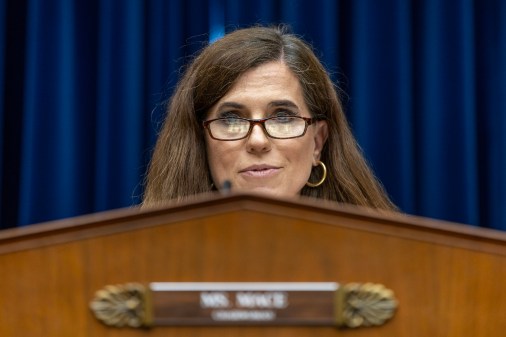Tech-savvy lawmakers found blockchain caucus

Two lawmakers are joining hands across the aisle to form a congressional caucus to promote blockchain — the distributed ledger technology underlying bitcoin and other cryptocurrencies.
Reps. Mick Mulvaney, R-S.C. and Jared Polis, D-Colo., announced the formation of the new bipartisan Congressional Blockchain Caucus Monday, saying it would be “dedicated to the advancement of sound public policy toward cryptocurrencies and other blockchain-based technologies.”
The move was welcomed by the technology’s enthusiasts.
“For the past two years, we’ve worked with both congressmen to educate lawmakers about blockchain — what it is, how it works, why it’s important,” said Jerry Brito, executive director of Coin Center, a think tank that focuses on policy questions raised by the new technology.
He told FedScoop the caucus would formalize that pedagogic work, “Especially with the new Congress.” Its members would be lawmakers “who see the potential in the technology and want it to flourish.”
Blockchain is called a distributed ledger because it uses encryption and distributed computing power to create a constantly updated and cryptographically secure record of transactions that’s distributed among all its participants.
“Blockchain technology has the potential to revolutionize the financial services industry, the U.S. economy and the delivery of government services,” said Mulvaney.
Because it generates a trustworthy record of a transaction held by all parties to it, many people see blockchain as the key to moving, tracking and storing all kinds of value and valuable information online — growing well beyond digital currency.
“The blockchain has boundless potential,” Polis said. “From cryptocurrencies to supply chains to banking to property titling, blockchain-based solutions have the ability to decentralize cybersecurity and revolutionize many industries.”
[Read more: Big banks join UBS on blockchain plan]
Banks have already begun studying how blockchain can be used for interbank settlements, for instance.
Brito said the caucuses first order of business ought to be “to ensure that the regulatory agencies [Congress] oversees do not place unnecessary hurdles or barriers to [Blockchain] development.
Eventually, he hoped the lawmakers would set about “removing any regulatory impediments” that already exist, for instance by creating a federal “safe harbor” from state money transmission licensing requirements for cryptocurrency operators who don’t take custody of consumer funds.
Those regulations, he said, were designed to apply to conventional money transmitters like Western Union or even PayPal, who take money from members of the public and send it across state or national boundaries.
“It makes sense that such business need to be vetted, licensed, bonded and subject to capital requirements,” he explained. But some types of cryptocurrency operations could transfer value “without ever taking custody of consumers’ funds.”
The various state-level regulations — and varying interpretations of whether they applied to non-custodial cryptocurrency operations — had “created an environment of uncertainty,” said Brito, which he urged Congress to deal with.






